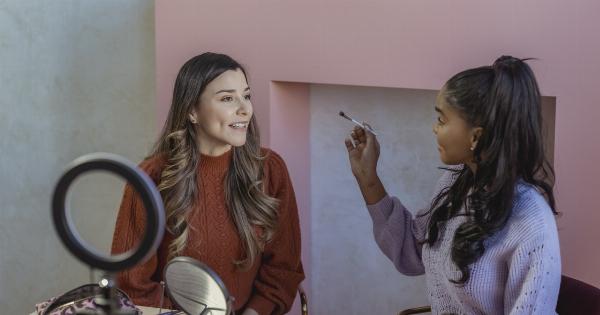Mirrors are an integral part of our daily lives. We use them to check our appearances, make sure we look presentable, and to get a glimpse of how others see us.
But have you ever wondered what your mirror says about you? Surprisingly, mirrors can reveal more than just physical reflections. They can reflect our confidence, self-perception, and even our emotional well-being. In this article, we will delve into the different aspects of what your mirror says about you.
The Mirror and Self-Perception
The mirror is often considered a gauge of self-perception.
When you look into the mirror, how do you feel about the person looking back at you? Are you satisfied with your appearance, or do you find flaws that bother you? Our self-perception can significantly impact our confidence levels and overall well-being. If you constantly scrutinize yourself in the mirror and find flaws, it may be a sign of low self-esteem and body image issues. On the other hand, if you feel confident and comfortable with your reflection, it indicates a positive self-perception.
Body Language and the Mirror
The way we interact with the mirror can reveal a lot about our body language and non-verbal communication.
When you stand in front of the mirror, do you stand tall with an open posture, or do you slouch and avoid eye contact with yourself? Confident individuals tend to maintain a positive posture and make eye contact with their reflection. Conversely, those who display closed body language or avoid looking into the mirror may be experiencing feelings of insecurity or discomfort with themselves.
Mirror, Mirror on the Wall
Are you someone who frequently seeks validation from the mirror? Do you continually ask the mirror if you look good or seek reassurance about your appearance? Constantly seeking external validation can be a sign of a fragile self-esteem.
While it is natural to want to look presentable, placing too much importance on the mirror’s opinion can hinder our self-confidence. Remember, beauty is subjective, and it is more important to embrace and love yourself rather than relying solely on external validation.
The Emotional Mirror
Mirrors can also reflect our emotional well-being. Have you ever noticed how your emotions can directly influence how you perceive yourself in the mirror? When you are feeling happy and content, you are more likely to see a positive reflection.
However, during times of stress, sadness, or self-doubt, you may find it challenging to see the beauty in yourself. This emotional connection with the mirror emphasizes the importance of addressing our emotional well-being alongside our physical appearance.
The Role of Cultures and Societal Standards
The way we perceive ourselves in the mirror is greatly influenced by cultural and societal standards of beauty. Different cultures have diverse beauty ideals that can shape our self-perception.
For example, in some cultures, fair skin may be idolized, while in others, curvier body types are considered more desirable. Societal standards perpetuated through media and advertising also play a significant role in shaping how we view ourselves in the mirror. It is essential to recognize and challenge these standards to foster a healthier self-perception.
Mirror, Mindfulness, and Self-Care
Mirrors can be powerful tools for practicing mindfulness and self-care. Taking time to focus on yourself and your reflection can help you cultivate self-compassion and positive self-talk.
Instead of criticizing yourself, use the mirror as a reminder to appreciate your unique qualities and strengths. Practice gratitude for your body and the incredible things it allows you to do. Incorporating mindful mirror exercises into your daily routine can help foster a more positive relationship with your reflection.
Mirror Rituals and Metaphors
Mirrors hold significant symbolic meaning in various rituals and metaphors across different cultures.
From the ancient Romans breaking mirrors to ward off bad luck to using mirrors in Feng Shui for attracting positive energy, mirrors have been associated with superstitions and beliefs. Additionally, the phrase “mirror, mirror on the wall” from the Snow White fairytale highlights the mirror’s portrayal as a mirror of truth or a confidant.
These rituals and metaphors reveal the unique fascination humans have with mirrors and their impact on our psyche.
The Mirror and Personal Growth
The mirror can also serve as a tool for personal growth and self-reflection.
When you look into the mirror, do you see someone who has grown and evolved, or do you see a static version of yourself? Taking the time to reflect upon your journey and how you have changed can be empowering. The mirror can remind you of how far you’ve come and motivate you to continue growing. Embrace the mirror as a friend who witnesses your personal transformation and encourages you to become the best version of yourself.
The Mirror’s Influence on Confidence
Confidence and the mirror are intrinsically linked. When we feel confident, it can radiate through our posture, expressions, and overall demeanor. On the other hand, a lack of confidence can manifest in anxieties about our physical appearance.
The mirror can either reinforce our confidence or act as a barrier to our self-assurance. Recognizing the mirror as a tool to enhance confidence rather than a source of validation is crucial. It is through cultivating inner confidence and self-acceptance that the mirror truly transforms into a reflection of strength and beauty.
Conclusion
The mirror is more than just a reflective surface. It holds the power to reveal our self-perception, body language, emotions, cultural influences, and personal growth.
By understanding what our mirror says about us, we can learn to develop a healthier relationship with our reflection. Remember, the mirror should be a tool for self-care, self-empowerment, and self-compassion. Embrace the person staring back at you, appreciate your unique qualities, and let the mirror reflect the beauty that radiates from within.





























